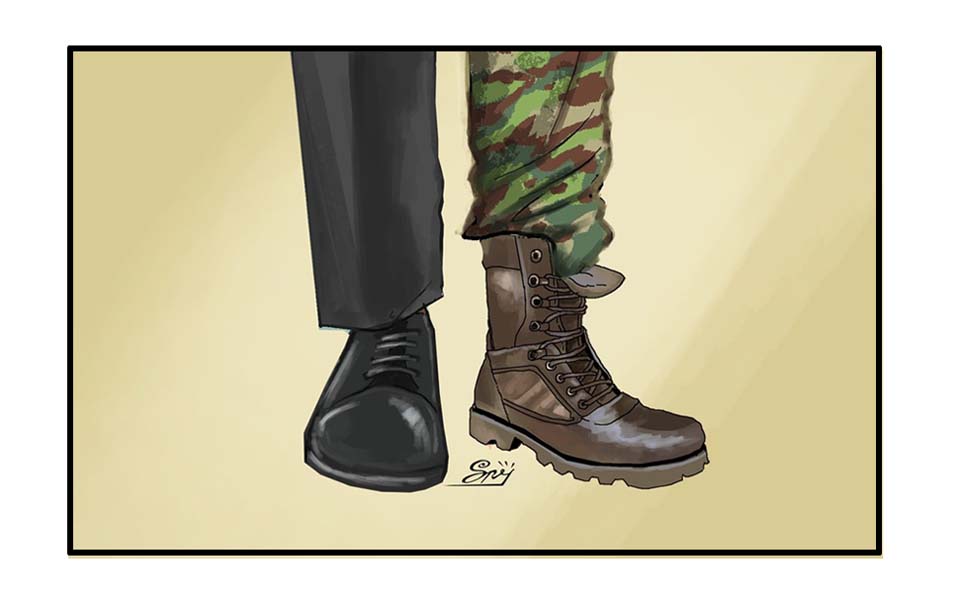
[From an oped piece in Kompas.id by Al Araf titled "Rejecting the Return of ABRI's Dwi-Fungsi".]
The main base of support for the New Order regime of former president Suharto at that time was ABRI – the Indonesian Armed Forces now called the TNI. Within ABRI there were military and the police elements that were deeply involved in the socio-political life of Indonesia at that time.
They not only occupied civilian positions, but also controlled and managed politics, including being involved in the manipulation of the elections for the benefit of the Suharto regime by ensuring victory for the ruling Golkar Party. ABRI and Golkar at that time were the two main legs for the Suharto regime.
The involvement of ABRI in socio-political life rested on the its doctrine of dwi-fungsi (dual function) which explains that the military does not just focus on the field of defence, but is also involved in socio-political life.
It was on the basis of this doctrine that ABRI was infested almost all spheres of civilian life and civilian positions. To perpetuate ABRI's dwi-fungsi doctrine, Suharto misused, made permanent and conditioned the military's territorial command structure (Koter) as part of the structure of his political power that reached from the centre down to the villages.
It was the strong military hegemony and dominance at that time which resulted in democratic space not being available. What happened was intimidation, spying, repression, criminalisation, abductions and murder in the name of the country and maintaining security and stability, resulting in various forms of human rights violations in Indonesia.
In the end, ABRI domination brought elements civil society into motion, especially students, who called for ABRI's dwi-fungsi doctrine to be abolished. The pro-democracy groups asked the military to return to the barracks, no longer be involved in socio-political life and not to occupy civilian positions.
The struggle to revoke ABRI's dwi-fungsi was a crucial part of the reforms that was fought for with great effort and resulted in the loss of many lives.
Finally, after Suharto was successfully brought down by the reform movement, the dwi-fungsi doctrine was abolished and the military prohibited from being involved in politics and occupying civilian positions with the exception of certain posts as stipulated under Law Number 34/2004 on the TNI.
Dwi-fungsi
The long road to reform of the defence and security sector is known as the security sector reform agenda (RSK). This RSK aims to create clean and good governance in the security and defence sector because basically this sector is public goods so transparency, accountability and professionalism are the main objectives of developing the defence and security sector.
The reform of the defence and security sector does not want security defence actors to be involved in political life, but focus on their duties and functions to maintain the defence and security of the country.
Now, after more than 20 years that these reforms have been running, the signs of the return of ABRI's dual function are again increasingly apparent. Through the establishment of Law Number 20/2023 on State Civil Servants (ASN Law) and the Draft Government Regulation on the Implementation of the ASN Law, the military and police (formerly combined under ABRI) will again be allowed to occupy civilian positions. Article 19 paragraph (2) of Law Number 20/2023 on ASN states that certain ASN positions can be filled from TNI soldiers and members of the National Police.
The ASN Law and the government regulation are actually just a strategy to legalise irregular practices that are already occurring, where active military officers occupy many outside positions that are allowed by law, such as in various ministries and state-owned enterprises (SOEs). The Defence Ministry noted that in 2019 there were 1,592 TNI soldiers who held civilian positions and 29 of them were illegal because they were outside of what is allowed under the TNI Law.
This does not yet include records by the Indonesian Ombudsman that at least 27 TNI active members are serving in in SOEs. In fact, of late there has also been active TNI officers who occupy regional head positions such as in West Seram regency. This data does not include members of the National Police in civil and SOE positions, of which the exact number is unknown.
If the ASN Law and government regulation are actually implemented, this would clearly threaten democracy because of the legalisation of the return of ABRI's dwi-fungsi practices during the New Order authoritarian era. The TNI is a national defence tool tasked with facing the threat of war. While the National Police are tasked with maintaining security, public order (Kamtibmas) and law enforcement...
[Al Araf is a senior researcher with Indonesian Human Rights Watch (Imparsial) and teaches at the Brawijaya University.]
The full article in Bahasa Indonesia can be read here: https://www.kompas.id/baca/opini/2024/03/24/menolak-kembalinya-dwifungsi-abri





